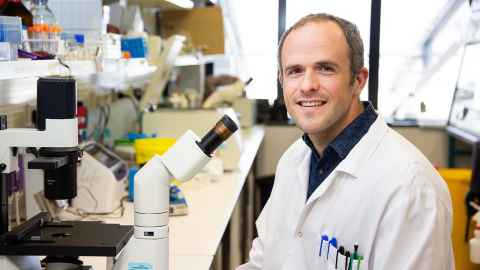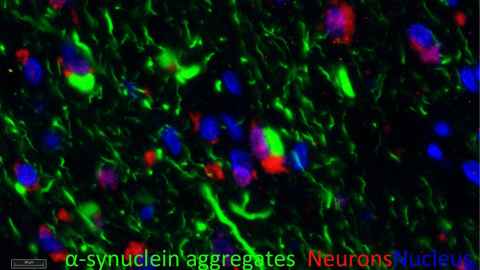Stalling Parkinson's disease is Auckland scientist's goal
30 October 2020
What if doctors could stall Parkinson's before the shakiness started? That's the ambition of a University of Auckland scientist.

Dr Victor Dieriks, of the Centre for Brain Research in the Faculty of Medical and Health Sciences, just got $571,000 from the Health Research Council to extend his Parkinson's research.
He’s focused on different types of toxic clumps of the protein alpha-synuclein -- called strains -- that accumulate in the brains of Parkinson’s patients. These clumps seem to show up first in the nose, causing a loss of smell, before spreading through the brain.
What Dr Dieriks is trying to figure out is: which genes play the most prominent roles in the production of alpha-synuclein – and can they be tweaked to reduce the protein’s spread?
This is a complex disease that is difficult to cure – but we could delay its
progress in individuals and give people extra years of good quality life
He's working with strains of alpha-synuclein imported from Paris and brain tissue cultured from donations to the Neurological Foundation Human Brain Bank and the Hugh Green Biobank. The end game is for doctors to be able to intervene to stall the disease.
By the time people are diagnosed with Parkinson's, neurons in an area of the brain that controls movement have been decimated, strangled by the clumps of alpha-synuclein. But that may be as long as 10 years after the first subtle symptoms of the disease, commonly including the loss of smell. That’s the window for intervention.

"This is a complex disease that is difficult to cure – but we could delay its progress in individuals and give people extra years of good quality life," says Dieriks, who's also a member of Brain Research New Zealand.
The funding comes via a five-year Sir Charles Hercus Health Research Fellowship, intended to support Dr. Dieriks as an emerging scientist with outstanding potential. A grant from The Michael J. Fox Foundation previously supported his work.
"Is the solution for Parkinson's right in front of our nose?" he asks.
Media contact
Paul Panckhurst | media adviser
M: 022 032 8475
E: paul.panckhurst@auckland.ac.nz